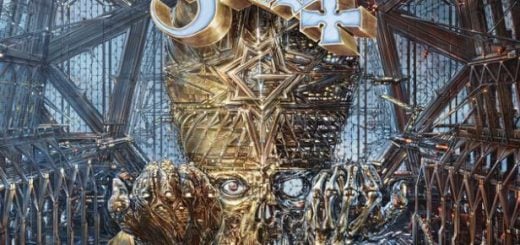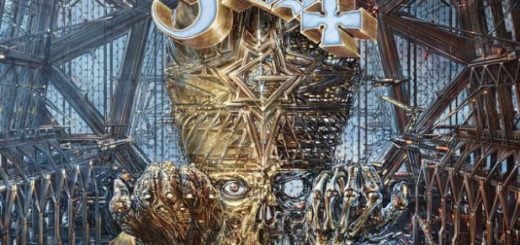Kaisarion by Ghost Lyrics Meaning – An Allegorical Journey Through History and Human Nature
- Music Video
- Lyrics
-
Song Meaning
- Empires Rise from Ashes: Rebirth or a Cyclical Doom?
- Between the Sacred and the Profane: The Dichotomy of Faith and Reality
- Unspoken Echoes: The Weight of Regrets and Missed Opportunities
- Veiled Truths: A Prism of Deceit and the Mockery of Purity
- The Symphony of the Song: Memorable Lines That Resonate
Lyrics
Kaisarion
A prophecy told
We’re building our empire
From the ashes of an old
Kaisarion
The fruit of the womb
Our brotherhood of good faith
Sealed an apostate witch’s doom
It’s the sound of another deadline
Whistling past your ears
It’s the sight of a million regrets
Mounting over years
It’s the words that were never spoken
That echoes through the times
It’s the smell of the burning temples
Swept away by rhymes
(Hypatia) far away from the stench of the heavens
(Hypatia) long ago, yet too close to forever
(Hypatia) when the paradise is lost, go straight to
Kaisarion
A matter of love
When mother earth is calling
For a father up above
Kaisarion
Put on the smiles
And throw your holy rocks
Right at her, for her satanic wiles
It’s the truth of candor shone
Through a prism of deceit
It’s the continence of bishops
With their choirboys ensuite
It’s the tongue selling adulation
That licks to no avail
It’s the noise of the righteous dogma
That hides the handmaid’s tail
(Hypatia) far away from the stench of the heavens
(Hypatia) long ago, yet too close to forever
(Hypatia) when a paradise is lost, go straight to
It’s the sound of another deadline
Whistling past your ears
It’s the sight of a million regrets
Mounting over years
It’s the words that were never spoken
That echoes through the times
It’s the smell of the burning temples
Swept away by rhymes
It’s the truth of candor shone
Through a prism of deceit
It’s the continence of bishops
With their choirboys ensuite
It’s the tongue selling adulation
That licks to no avail
It’s the noise of the righteous dogma
That hides the handmaid’s tail
(Hypatia) far away from the stench of the heavens
(Hypatia) long ago, yet too close to forever
(Hypatia) when a paradise is lost, go straight to
(Hypatia) far away from the stench of the heavens
(Hypatia) long ago, yet too close to forever
(Hypatia) when a paradise is lost, go straight to
Infamous for their theatrical flair and enigmatic storytelling, the band Ghost returns to unsettle the music scene with ‘Kaisarion’ – a track that quickly etches itself into the auditor’s consciousness not just for its melodic prowess but for its labyrinthine narrative. At a cursory glance, you imbibe the anthemic qualities of the music, the catchy chorus, the almost hymnal chant of ‘Hypatia.’ But as you peel back the sonic layers, you unearth a kaleidoscope of historical references, nuanced symbolism, and metaphoric sagacity.
Diving deep into the enigmatic waters of ‘Kaisarion,’ we find ourselves wrestling with themes that grapple with the constructs of empire-building, the inescapable nature of time, and the dichotomy of truth and deceit. This track, though deceptively straightforward in its harmonic structure, is a narrative and philosophical odyssey – a commentary wrapped in an allegory, dipped in Ghost’s signature sonic sorcery.
Empires Rise from Ashes: Rebirth or a Cyclical Doom?
The opening lines of ‘Kaisarion’ immediately present us with a prophecy – a vision of resurgence from ruin, the cycle of empires building upon the rubble of their predecessors. While it instills hope for revival, it subtly underscores the inevitability of historical repetition, the idea that each ‘new’ empire is but an echo of something bygone. It becomes a dialogue on whether progress truly exists or if humanity is confined to a Sisyphean loop.
The invocation of ‘Kaisarion’ as the fruit of the womb introduces themes of legacy and inheritance – perhaps even a messianic figure born of earth itself, signalling a new era or the resurrection of old philosophies in modern guises. Here, Ghost showcases their penchant for infusing their music with veiled depth, challenging listeners to consider the implications of history’s relentless march.
Between the Sacred and the Profane: The Dichotomy of Faith and Reality
In ‘Kaisarion,’ Ghost juxtaposes religious zeal with worldly imperfections, painting vivid imagery of ‘burning temples’ and ‘holy rocks’ hurled in sanctimonious spite. It draws an intimate portrait of the battles waged between the sacrosanct and the sinners, perhaps as a metaphor for the ongoing conflict between moral posturing and human nature’s inherent flaws.
The repeated references to ‘Hypatia’ — the learned woman of Alexandria who fell victim to brutal religious fundamentalism — serve as an anchor point in this song. Ghost uses her as a symbol of enlightenment and reason that stands in defiance against the ‘stench of the heavens,’ or the corruption of spirituality and the persecution it can lead to. It’s a nod to the tragic loss of knowledge and the vilification of science and philosophy in the face of dogmatic oppression.
Unspoken Echoes: The Weight of Regrets and Missed Opportunities
The chorus of ‘Kaisarion’ is haunted by the ‘sound of another deadline’ and the ‘sight of a million regrets.’ These lines delve into the heart of human introspection, the universal experience of reflecting upon what could have been, had different choices been made or different words been spoken. Ghost excels at evoking emotions that resonate with the collective consciousness – the persistent ‘what ifs’ that shape our lives.
Metaphorically, the song hints at history’s silent screams, the critical junctures where a slight divergence might have rewritten our collective narrative. The notion that these missed chances ‘echo through the times’ suggests a lasting impact, a subtleties of present formed by the absent past.
Veiled Truths: A Prism of Deceit and the Mockery of Purity
Ghost doesn’t shy away from controversy or moral introspection, and ‘Kaisarion’ reflects this through its critical examination of duplicity. The ‘prism of deceit’ and the ‘continence of bishops’ with ‘choirboys ensuite’ mirror societal hypocrisy, the way in which entities project an image of purity while concealing their sordid underbelly.
The song condemns the performative nature of virtue, unmasking the often-unused ‘tongue selling adulation.’ Here, Ghost metaphorically berates the emptiness of praise when it serves to prop up a facade, the way loud ‘righteous dogma’ drowns out the suffering and injustices taking place behind closed doors, symbolized by ‘the handmaid’s tail.’
The Symphony of the Song: Memorable Lines That Resonate
Within ‘Kaisarion,’ there are lyrical motifs that linger long after the song fades. ‘When the paradise is lost, go straight to’ begs interpretation—a call to action, reflection, or a return to origins in the face of downfall. It’s a captivating lyrical hook, part mantra, part riddle, that encapsulates the song’s essence.
Moreover, the recurring lament—’far away from the stench of the heavens’—becomes a powerful repudiation of false sanctity. It echoes the disillusionment with dogmatic rigidity and the hunger for spiritual authenticity. Through lines like these, Ghost forges a connection with listeners, weaving a tapestry of thought that persists long after the music stops.








